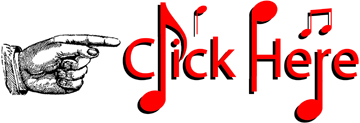W. C. Handy
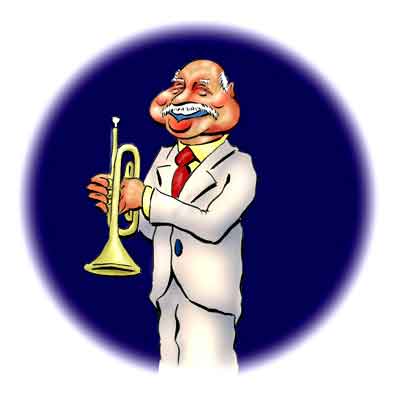
(Click to Zoom In and Out)
Anyone with the חצפה to call themselves an
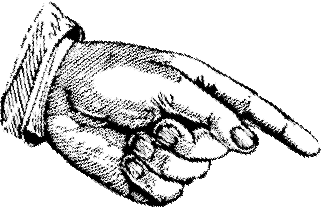

... knows that William Christopher Handy - "W. C." professionally - wrote the most iconic jazz song ever.
Of course, it would be an insult to believe that a true American would not know the name of the song. But for those who wish to hear a rendering the likes of which the world has never heard, you can open a new page with both an audio file and sheet music if you
And when we say the likes of which the world has never heard, we mean THE LIKES OF WHICH THE WORLD HAS NEVER HEARD!
William Christopher Handy was born in 1873 in Florence, Alabama. Known as "Bill" to his friends, his life as you read it in the various books could hardly be crafted by a novelist. He was born in a log cabin, and his father, Charles, was a minister who believed that music was the Devil's pastime. But lo!, through natural talent, perseverance, and plain hard work, Bill managed to elude his father's watchful eye and develop his musical skills until he reached the pinnacle of fame and fortune, living a long and happy life full of honors.
Actually. that's not that far from the truth.
Yes, Bill really was born in a log cabin and his dad was a preacher. As a minister Charles was one of the leading figures in the town's black community since wearing the cloth was one of the few - quote - "respectable" - unquote - routes available for African Americans to rise in the world (as it was called). Formal education was not a particular requirement for a clergyman, and the distinction between a lay preacher and a full time minister was blurred. Many ministers had other jobs and there were everyday workers who would preach. When he wasn't preaching, Charles was a farmer.
Details of the Handy family are a bit uncertain despite Bill leaving us an autobiography. Some accounts say Bill had two siblings. But the other story is that Elizabeth died soon after Bill left home and these kids were from Charles's second marriage.
In any case Elizabeth was more easy going than her husband in raising her music loving offspring. Still, both she and Charles made sure Bill - Elizabeth called him "William" - attended the local school. By all accounts and although his eyesight was weak, he was a good student.
Bill would later tell how after school, he would sneak in to the Florence's Exchange Hotel where the then-governor of Alabama, Edward O'Neal, would drop in. Apparently the governorship was a pretty loose job and Ed (who was also one of Florence's leading attorneys) would sit in the lobby and gab with his friends. No one seemed to care about the little black kid hanging around and Bill said he learned the rudiments of public speaking from listening to the governor's expostulations about the current events.
Given the typical attitudes of "good God-fearing people" against frivolous pastimes, the Handy household was not ideal for a kid with a natural ability for music. Since Charles objected to his son's interests, Bill began teaching himself on the sly. Showing an aptitude not only for music but for business, he made enough money on his own that his dad didn't even know when he bought a guitar. Charles eventually relented a bit and let Bill learn to play the organ for the church services.
All in all it wasn't really music per se that Charles objected to, but (ptui) secular or rather popular music. And Bill did indeed receive a good grounding in music. The schoolmaster at the local school was Young Wallace (Young was his real name, not a designation of his age nor an inversion of the given and surname). Professor Wallace - as he was known to both the black and white citizens of Florence - had graduated from Nashville's Fisk University and felt that a strong musical foundation was essential if you were to call yourself educated.
That Bill had absolute pitch1 ensured his progress would be rapid. He not only could write down songs he heard but also would transcribe normal sounds such as bird calls into musical notation.
Footnote
The ability to recognize a given note by ear - sometimes called "perfect pitch".
Until he was eight years old Bill never really understood that he was living in a two-tiered community separated by race. In the 1870's the plans for Reconstruction had been tossed out the window and the Southern states began ensuring that life would continue in a massively separate and equally massively unequal society. The reality of Southern life struck home when Bill heard a local politician give a speech where he loudly proclaimed that he would never fund a dollar for the education of black schools.
Of course that's not the way the politician (whose name we don't know) put it, and in fact the language of the speech was so vile that Bill ran back home in panic. His mother had the sad job of explaining to her son the realities of living in a segregated world.
In such a time and place there were only two options. Either leave the South for the North - which in many ways wasn't a whole lot better - or put up with it. For the time being, Bill put up with it.
When he was twelve, Bill got an after-school job bringing water to construction workers who were building locks and levees of the Tennessee River. This was the time that work songs were still sung as a matter of course. The songs were not just to pass the time while doing boring work (which they did). Instead they also helped the workers set the pace so that everyone could work as a team and slower workers would not be singled out2.
Footnote
Levee work on the Mississippi could be brutal and slow workers were routinely beaten. The work was hard and the worst of the levee camps were even more violent than the worst of the mining and cattle towns of the Old West. Furthermore the foremen - who were inevitably white - exercised the same authority as the overseers had on the slave plantations.
The foremen had a schedule to keep and if the workers didn't do the required work they could be made to serve as examples to make sure others would. Although it was the South, the temperature could still be cold in winter when a lot of the levee camps were active. One mule driver mentioned that if you stopped by a fire to warm up, one of the bosses would club you in the head with a pistol.
Once the men signed up for a camp they found that they couldn't leave. If they attempted to quit they could be beaten or even killed. Although the men were supposed to get paid weekly, sometimes they worked for months and received nothing. One worker said he worked for three months and received only ten dollars in pay. As to why the men signed up in the first place, one levee worker said that when times got rough there simply weren't better jobs around.
That said, it appears that Bill was not working in a levee camp. Instead the workers were from the town and went to work each day and went back home at night. Evidently the men got their pay regularly and Bill was paid $3 a week.
Bill heard the songs the men sang and noted their variety. Of course there were work songs but there was also a type of song that didn't follow the usual key and time signatures and instead the singers would slip in extra beats and flatten certain notes that normally you wouldn't - thirds, fifths, and even sevenths for crying out loud! The unusual timing and intervals gave the songs a melancholy sound which somehow made the singers seem a bit more cheerful. By the turn of the century men were calling these tunes the blues. Bill could pick out the notes but he was sure not to repeat the lyrics - at least not around his house.
As Bill got older it was clear his mom and dad expected him to do more than just work odd jobs. But they didn't want him to be a musician either. That admonition was going to be a hard sell since Bill was soon to learn that you could make money at it.
At one point a locally famous fiddle player named Joe Turner was hired to play a local dance. But since his accompanist had backed out, Joe tapped Bill who could play the guitar. Bill got paid eight dollars for this single performance - good pay compared to the $3 a week he made carrying water to levee workers.
But when Charles heard that his son was playing, not just secular music, not just popular music, but dance music, he expressed his feelings more in sadness than in anger. "Son," he said, "I'd rather follow you to the graveyard than to hear you had become a musician." That Bill had skipped school to play the gig also brought a rebuke from Professor Wallace.
There was, though, a slightly more respectable venue open for aspiring musicians. Brass bands had become the most popular ensemble for concerts after the Civil War when the regimental brass bands had played for the townspeople wherever the soldiers were stationed. These bands eschewed stringed and reed instruments since trumpets, cornets, euphoniums, and tubas were far more rugged to tote around.
By the last decades of the 19th century, virtually every town had their evening summer concerts in the park. A town might have their own local musicians play, but there were also traveling professionals and Bill was determined to be one of them.
His plans, though, were cut short when he graduated from school. At his dad's insistence, he applied for a job as a teacher's assistant. To his chagrin, he was hired.
Fortunately - at least for Bill - his educational career was over before it began. When he found that day laborers made twice what teachers did, he got a job at the local foundry. Naturally he also kept up with his music. By the time he was twenty, Bill was playing cornet in a brass band3.
Footnote
The cornet was - and remains - somewhat more popular in wind ensembles than its near lookalike, the trumpet. The cornet is a bit shorter and taller than a trumpet but the real difference is that the trumpet has tubing that is called cylindrical bore and the cornet has conical bore. In other words, the diameter of the tubing of the trumpet doesn't change diameter until before the last stretch before the bell. The tubing of the cornet, though, gets wider starting earlier. There are also more bends of the tubing in a cornet than the trumpet.
The net result is that the trumpet produces a sharper tone suitable for fanfares and the cornet has a more mellow sound. In todays marching bands, many of the - quote - "trumpet players" - unquote - are actually playing cornets.
In 1893 the World's Fair in Chicago was announced as a celebration of the Dawn of the Modern Era. Bill and the band figured Chicago could find a place for another band and they hitched rides on freight trains since as long as you avoided the yard bulls such transportation was free. Unfortunately virtually every band in the country had the same idea and Chicago was a buyers' market for performing musicians.
Finding themselves penniless with no prospects, the group checked out other towns for more lucrative markets. Finally they ended up in St. Louis. Most of the band then headed back to Florence but Bill hung on.
As there was no immediate demand for cornet players, Bill started working odd jobs. Since he was broke, he asked for an advance on pay, which the boss gave him in pawn for Bill's watch. But when Bill paid the debt back, the boss refused to return the watch. Bill went to the cops who promptly told him to beat it or they'd arrest him for vagrancy.
Finding St. Louis less than congenial, Bill hopped another freight and got off at Evansville, Indiana, about 150 miles to the east. To his surprise he managed to get a job playing in the local brass band. Even more of a surprise, it was pretty steady work and he kept with the group for three years, from 1893 to 1896.
With real experience now under his belt, Bill found work in other bands. Once he landed a job playing on a riverboat up and down the Mississippi. Of course, there were still times when music jobs were scarce but Bill even turned the lean times to his advantage. Once he got a job as a janitor in a building that housed an organization for German immigrants. Naturally they brought their musical traditions with them and when the president of the organization learned of Bill's musical interests, he taught him the rudiments of vocal arrangement.
About this time Bill got a letter from one of the former band member who recommended he get a job in a traveling band. This would take him around the country and give him opportunity for connecting with other musicians. So in 1898 Bill joined a band called Mahara's Minstrels. The Mahara's Minstrels as the name tells us was a traveling minstrel show.
Today the minstrel show is looked on as a horribly degrading form of entertainment. Even black musicians had to adopt to the expected conventions and appear in "blackface" makeup. Between the songs were comedy routines which used the most blatant stereotypes of African American culture.
While not saying this picture is entirely untrue, there are a number of surviving recordings made in the 19th century of minstrel performers. Without watching whatever action would have been on stage, the performances often come off simply as straightforward singing and telling of jokes although the jokes themselves can be pretty corny. Certainly the minstrel troupes offered opportunities for actors and musicians that are rare today, and a number of the traveling performers later went on to become stars of the early 20th century radio and films.
The Mahara's Minstrels went around the country and even up to Canada and down to Cuba. Here we begin to see Bill getting particular notice - and good reviews - from the press.
As the last years of the 19th century rolled along, Bill found himself financially secure enough to marry a young woman named Elizabeth Price whom he had met in Henderson, Kentucky. With his travel he wasn't at home a lot but despite his absences (or perhaps because of them) the marriage lasted almost forty years.
But being on the road all the time was tiring and around 1900 he and Elizabeth moved back to Florence. There he got a job teaching music at Alabama A & M University (still going strong) even though he only had a high school education. For the next decade, Bill alternated between teaching music in schools in Alabama and Mississippi and playing professionally. Also from 1900 to 1915, he and Elizabeth had five children.
As a member of the Mahara's Minstrels, Bill wrote and arranged songs and he saw an opportunity beyond being an itinerant musician. This was the era when the music industry was still largely performing or selling sheet music, and in 1914, Bill managed to sell an early composition, the Memphis Blues. At the publisher's suggestion, he sold the tune outright rather than for royalties. After all, wasn't it better, the publisher smiled, to get a lump sum now than to have the money come in as dribs and drabs? And if the song didn't sell, why, Bill would still have his dough.
But when Bill found that the sheet music sold over 10,000 copies in a few weeks, he was chagrinned, particularly since the tune had sold a thousand or so copies before the publishers made his "generous" offer. At that point Bill decided 1) he'd keep the rights to what he wrote, and 2) he'd go into the publishing business himself.
One of Bill's first releases as an independent publisher was The Saint Louis Blues. Although the song wasn't a hit right off, the musicians liked it, not the least since you could play it slow, fast, and in various styles. It's adaptability was due largely it being a combination of ingredients. There were elements of the blues and jass (soon to be called "jazz") but also Latin American rhythms.
The song was to bring Bill both fame and financial security, and in a few years it had become part of America's collective consciousness. It was mentioned twice in James T. Farrell's early 20th century novel Studs Lonigan, once when the gang (minus Studs) went to an integrated night-club in Chicago's South Side, and again when Studs heard the song being played as he walked through the old neighborhood.
In 1912, Bill and his song writing business partner Harry Pace decided to incorporate their business as the and Pace and Handy Music Company. They also formed their own orchestra, and although only in his mid-forties, Bill was now considered to be the grand old man of jazz.
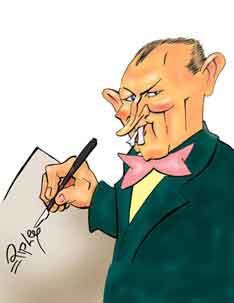
Robert
The Big Time
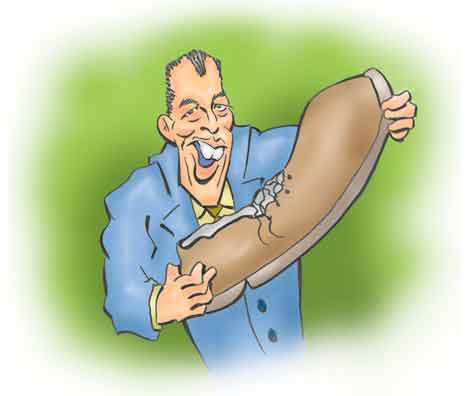
Ed
The REALLY
Big Shew.
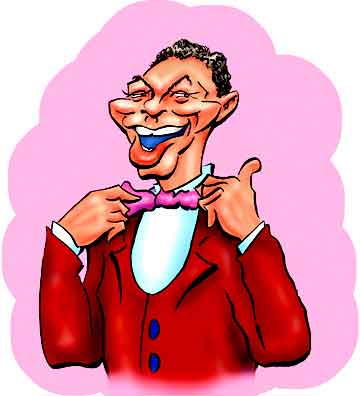
Nat ...
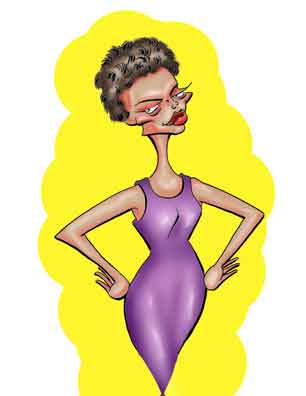
... and Eartha
The Ultimate Accolade
Bill's business had been taking him more and more often up to New York, and by 1920, he and Elizabeth had decided to settle in Manhattan. It was a good choice and in 1928, Bill was invited to perform with a group that played in Carnegie Hall. Then in 1938, he really hit the big time when he was featured in one of Robert Ripley's Believe It or Not short films.
Or maybe even that wasn't quite the biggest of the big times. In 1957, he appeared on The Ed Sullivan Show where he played (what else?), The Saint Louis Blues. Bill was now 83 years old and it was a really big shew.
But the ultimate accolade - at least by today's standards - came the next year when Nat King Cole starred as Bill along with Eartha Kitt in a biopic about Bill's life. It was called (of course) The Saint Louis Blues, and although there were considerable liberties taken with the storyline, it's a good enough movie, and Nat and Eartha did a good job, both singing and acting.
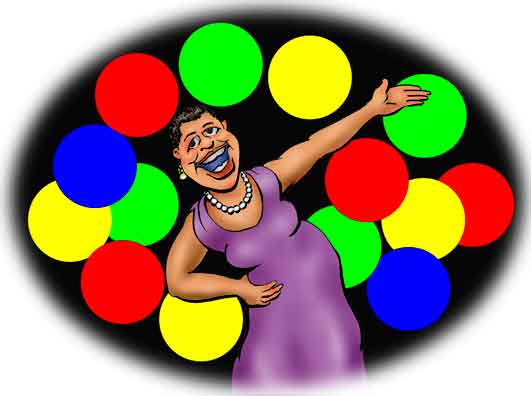
Bessie
She made the first video.
The Saint Louis Blues has been played by virtually everyone who plays jazz. A (partial) enumeration of the artists who have left us their imprint includes (and to skip this rather lengthy list click here). Stephane Grappelly and His Hot Four, Mickey and Kitty, Emile Barnes, The Butch Thompson Trio, Ray Brown feat. Ahmad Jamal, Serge Delaite Trio, Fats Waller, Billy Eckstine with The Metronome All Stars, Akiko Tsuruga, Jess Stacy, Jay McShann, Gil Evans, Nick Nantos and His Fireballers, Adonis Rose and the N.O. Vaders, Erwin Helfer, Canadian Brass, Oscar Peterson, Ella Fitzgerald, Johnny Lytle, New Orleans Rascals, Duke Jordan, Rytmi-orkesteri - Johtaja including Erkki Aho, Ralph Flanagan and His Orchestra, Art Hodes, Joe Utterback, Big Tiny Little, Ran Blake, Metropolitan Jazz Band and Eva Olmerov, John Fahey, Manhattan Jazz Quintet, Charlie McCoy, Jack Hylton and His Orchestra, Freeman Clark, Bob Schulz and The Riverboat Ramblers, Floyd McDaniel with Dave Specter and The Bluebirds, The Dukes of Dixieland, Joyce Cobb, Swiss Dixie Stompers, Sidney Bechet with Bob Scobey's Frisco Band, Sonny Burgess and Kings IV, Johnny Mercer and The Pied Pipers with Paul Weston and His Orchestra, Phil Tate and His Orchestra, Sidewalk Hot Jazz Orchestra, Boyd Raeburn and His Orchestra, Janet Carroll, Richard Maltby and His Orchestra, Jools Holland, Ruby Turner, Bobby Short, Lars Ek Quartet, George Barnes, Bill Black's Combo, Prince Gabe and The Millionaires with The Original Memphis Sound, Ralph Sutton, Ian Menzies and the Clyde Valley Stompers, Chris Barber's Jazz Band with Ottilie Patterson, Bernie Cummins and His Orchestra, Meade Lux Lewis, Toshiyuki Miyama and New Herd, Tres Para El Jazz, Sue Keller, Silvan Zingg Trio, Lanin's Southern Serenaders, Pete Fountain, Roger Williams, Tiny Grimes, Seger Ellis, Tim Laughlin, Nellie Lutcher with Dave Barbour and His Orchestra, Kay Armen, Joan Steele Trio, Ben Wasson, Ralph Sutton With Ruby Braff Milt Hinton Mousey Alexander, Efim Schachmeister with his Jazz-Symphonie-Orchestra, George Thorogood and The Destroyers, Hal Schaefer - Joe Mondragon - Alvin Stoller, Terry Snyder, The Rhythm Wreckers, Dave Brubeck Trio and Gerry Mulligan, Duane Eddy, His 'Twangy' Guitar and The Rebels, Eddie Zip and Sweet Magnolia, Booker Pittman, Bob Wilber - Kenny Davern, Al Bernard, Harry Connick, Jr., Doc Severinsen, Mary Lou Williams, The Progressive Four, Gregg Stafford with Big Bill Bissonnette, Paul Boehmke, Roberta Hunt, Emil Mark, Colin Bray, Dennis Elder, Steamboat Stompers, Brian Lawrance and His Lansdowne House Sextet, Turk Murphy and His Jazz Band, The Dozier Boys with Sax Mallard's Combo, Tommy Flanagan with George Mraz and Kenny Washington, Harmonious Wail, Eddie Higgins Trio, Bengt Hallberg, Stephane Grappelli and Bill Coleman, Charlie Hunter, Arvell Shaw and the Louis Armstrong Legacy Band, Roy Eldridge, Claude Williams, Herbie Hancock, Bobby Henderson, Stéphane Grappelli and McCoy Tyner, Marion Harris, Ida Cox with The Coleman Hawkins Quintet, Ted Heath, LaVern Baker, Miff Mole and His Nicksieland Band, Natalie Cole, Lucy Reed, Paul Kuhn and The Best, Max Roach, The Bruce Turner Jump Band, Billy Ward and The Dominoes, Lainie Kazan, Handy's Memphis Blues Band, Charlie Mariano and Dieter Ilg, Artie Shaw and His Orchestra, Los Indios Tabajaras, Fenix Jazz Band, Punch Miller, Alberta Hunter with Lovie Austin's Blues Serenaders, Jazzin' Jacks, Wilbur DeParis, Saint Louis Brass, Charlie Shavers, Larry Coryell, Esther Bigeou, Lt. Jim Europe's 369th Infantry "Hell Fighters" Band, Concert Band and Chorus of the R.A.A.F., Albert Nicholas with The Milan College Jazz Society, Jaye P. Morgan, Jonah Jones - The Quartet with Trombone, Peggy Dell, Erskine Hawkins and His Orchestra, Paul Smoker Trio, Les Paul and Mary Ford with Dick Hyman with The New York Jazz Repertory Company, Willard Robison, Lonnie Johnson With Elmer Snowden, Theo Croker, Carlo Krahmer's Chicagoans, Tex Beneke and His Orchestra, Carey Bell and Tough Luck, Cleo Laine, The Jungle Band, Wadsworth's Novelty Dance Orchestra, Parke Frankenfield and His Dixieland All-Stars With Guest Artist Maxine Sullivan, Ethel Waters, Gerry Wiggins and J.J. Hassan Shakur, Lazy Lester, Nouvelle Cuisine, Archie Shepp featuring Joe Lee Wilson, Mills Brothers, Machito and His Afro-Cuban Salseros, Patty Waters, Ruth Brown, Ted Lewis and His Jazz Band, Enrico Rava, Franco D'Andrea, Kiki Ebsen, The Happy Wanderers Street Band, 't Heidebloempje (The Heather Flower), Henry Jerome and His Orchestra, Wild Bill Davison and the Fulton Street Jazz Band, Frans Poptie and His Swing Specials, The Pete Siers Trio, Brenda Lee with The Anita Kerr Singers, Bandakadabra, Ellie Russell - Sy Oliver and Orchestra, Teresa Brewer, Furry Lewis, The Isley Brothers, Dizzy Gillespie, Ace Cannon, Joseph Robechaux and His New Orleans Rhythm Boys, Henghel Gualdi, Phil Napoleon and His Memphis Five, Johnny Maddox and His Dixie Boys, Booker Ervin, Povl Dissing, The Don Byas Quartet, Benny Golson, Reginald Foresythe, Bobby Wellins, Joe Candullo and His Everglades Orchestra, Duke Ellington and His Orchestra, Mance Lipscomb, The Judd Solo Band, Harold Ashby, Asleep at the Wheel, Bing Crosby and Duke Ellington, Toni Stricker, George Girard, Kay Starr and The Lantern Five, Witherspoon Mulligan Webster, Sue Palmer, Dave Clark's Blues Swingers with Floyd McDaniel, Willie "The Lion" Smith, 101 Strings, The Royal Garden Trio, The Merri-Men, Sidney Bechet and His Blue Note Jazzmen, Bill Coleman, Carol Bruce, Hot Owls, Ken Griffin, Helen Humes, Duke Robillard, Mildred Bailey and Her Orchestra, Samoa Wilson with The Jim Kweskin Band, Alvino Rey and His Orchestra, Peggy Lee, Gus Mulcay, Rod Mason and Beryl Bryden, Jacques Dieval, Jeanie Lambe and The Danny Moss Quartet, Billie Holiday, Jack Kane, Luckey Roberts, Down Home Jazz Band, Rudy Vallée and His Connecticut Yankees, Marian McPartland and Dave Brubeck, Wilbur DeParis and Jimmy Witherspoon, Shirley Bassey, Roy Clark, Eiji Kitamura and All Stars, Callahan Brothers, Esquire Boys, Pete Moore's Orchestra and Chorus, Angela Brown and Christian Christl, The Deep River Boys, Len Wilton and The New Rhythm Boys, Molly Cheshire, Robert Wells, Bill Borcher's Oregon Jazz Band, Armand Hug, McCoskey's Dixieland Allstars, Mario Pezzotta e il suo Complesso Dixieland Arethusa, Rossano Sportiello, Nicki Parrott, Eddie Metz, Ken Colyer's Jazzmen, The St. Louis Ragtimers, Danny Welton, Doc and Merle Watson, Warren Vaché and Bill Charlap, Clarence Williams and His Orchestra, Oscar Klein and Gus Backus, Bernie Leighton at the Piano, The Boswell Sisters, Pilsner Jazz Band, Bill Coleman et son orchestre, Guy Lombardo and His Royal Canadians, Sonny Jackson, Gorni Kramer, Firehouse Five Plus Two, Gary Crosby, Jim and Bob - Genial Hawaiians, Singleton Palmer and His Dixieland Band, Le High Society Jazz Band, New Orleans Helsinki Connection, Maxine Sullivan with Claude Thornhill and His Orchestra, John Cephas and Phil Wiggins, Perez Prado and His Orchestra, Ray Kennedy, Delta Rhythm Boys, Arne Domnérus, Bernt Rosengren, Max Greger, Cliff McKay, Original Dixieland Jazz Band, Minoru Muraoka, John Jackson, Ranch Romance, Sandviken Big Band, Lasse Lindgren, The Charlie Byrd Trio, Cozy Cole, Nino Tempo and April Stevens, Edmond Hall with The Ralph Sutton Quartet, Art Tatum, Peter Nero, Kid Ory, Tiger Okoshi, Paul Whiteman and His Orchestra, Perry Como, Milton Brown and His Brownies, The Teen Kings, Jonny May, Earl Humphrey and His Footwarmers, Bessie Smith, Romano Mussolini, Noah Wall, New Creoles Dixieland-Band, Robi Weber Quartet, Lea Gilmore, Larry Elgart and His Manhattan Swing Orchestra, Rob Hoeke, Martin Denny, The Pfister Sisters, Jimmy Smith, Eddie Kay Octet, Alice Babs, Jaki Byard Trio, Red Garland, Lew Stone and His Band, Kerry Strayer Trio - Kerry Strayer Quartet, Walden, The Old Spice Boys, Theo Hakola, Larry Adler, Louis Nelson's Creole Jazz Band featuring John Defferary, The Main Street Singers, Luther G. Williams, Freddie Slack, Kay Starr, Joe Augustine, Abe Lyman and His Californians, Odetta, Oscar Peterson, Ernest Hare, Claude Luter and son orchestre, Radiojazzgruppen, Jan Johansson, Buddy Hawkins and Key Notes - Big Sam Quintet, Michael Levy, Russell "Big Chief" Moore's Pow Wow Jazz Band, Maxine Sullivan, Lester Bowie, Mose Allison, Blind Connie Williams, Kenny Baker, Albert Nicholas featuring Miriam Klein, The Dorothy Donegan Trio, Ellis Larkins, Babs Gonzales, Eddie Peabody, The Preservation Hall Jazz Band, Prince's Band, Little Willie Jackson, Ove Lind, Buster Brown, Original-Teddies Directed by Teddy Stauffer, Jamie Wight's New Orleans Joymakers, Maxine Sullivan with Van Perry, Katharine Handy Lewis, Tom Baker and Bob Barnard, The Hank Marvin Guitar Syndicate, Django Reinhardt, The New Deal Rhythm Band with Cheryl Bentyne, Fred Böhler and His Band, Teo Macero, Dinah Shore, Andy Kirk and His Clouds of Joy, Rod Mason's Savannah Orchestra, Peter Spencer, The Bar-Room Buzzards, Russell Malone, Kordt Sisters med swingtet, Lino Patruno and The American All Stars, Antigua Jazz Band, Betty Bryant and Mark Christian Miller, Sun Ra, Chuck Berry, Alice Gerrard and Mike Seeger, Dorothy Donegan, Urbie Green, Olive Moorfield - Erwin Halletz with his Tanz-Orchester, Judy Canova With Orchestra, Diahann Carroll with the Duke Ellington Orchestra, Carrie Smith, Pete Krebs and The Kung Pao Chickens, Kenny Clarke With James Moody, John Lewis and Hank Jones, Charlie Barnet, Kid Thomas, Doc Severinsen and The Tonight Show Band, Raymond Burke and His New Orleans Jazz Band, Julia Lee, Don Thompson, Joe Daniels and His Hot Shots in Drumnasticks, Willis Jackson, Cybill Shepherd, Ted Heath and His Music, The Clark Sisters, Curio Cowboys, The World's Greatest JazzBand, Nobuo Hara and His Sharps and Flats, Washboard Rhythm Boys, Erroll Garner Trio, The Original Jazz Band, River Boat Five, Blanche Thomas with Papa French and His New Orleans Jazz Band, Jack Marshall, The Riverboat Ramblers, The Tom Kubis Big Band, Eubie Blake and His Orchestra, Fausto Papetti, Clark Terry, Mark Shane and Terry Blaine with Ed Polcer, Tom Artin, Allan Vaché, Phil Flanigan, Ed Metz, Jr., The Dave Rooney Trio, Max Collie's Rhythm Aces, Lenny Dee and His D-Men, Jesse's New Orleans Band with Anna Sise, Pat Boone, Lou Rawls, Wycliffe Gordon, Duke Ellington and Johnny Hodges, Cadillac Kolstad and The Flats, Hannibal Marvin Peterson, Bob Scobey's Frisco Band with Clancy Hayes, Frank Froeba and His Boys, Flashback Quartet, Marv Jenkins, Roman New Orleans Jazz Band, Chet Atkins, Maurice Rocco and His Rockin' Rhythm, Leny Eversong with Orchestra directed by Neal Hefti, Gene Austin, Earl Hines and Jimmy Rushing, Das Helmut Zacharias-Quartett, Die 12 Cellisten der Berliner Philharmoniker, Milt Buckner, Adrian Ford Big Band, Santo and Johnny, Dizzy Gillespie and His Orchestra, Jean-Michel Pilc, Anny Gould, Floyd McDaniel, Abbi HŸbner and His Low Down Wizards, Joe Sullivan, Dorsey Brothers Orchestra, Eddie Higgins with Milt Hinton and Bobby Rosengarden, Danny Kaye, Pokey LaFarge, Esther Haynes, David Swift with Rene Hall, Frankie Trumbauer and His Orchestra, The Kai Winding Trombones, Don Byron, Georgia Lee, Brubeck / Widelock Duo, Sol Hoopii and His Novelty Trio, Dallas Bartley, Hazy Osterwald, Johnny Dodds Trio, Natalie Lamb, Catherine Feeny, Daniel Dixon, Jackie Davis, Billie Pierce, De De Pierce, Geo. Henderson and Harrison Brazlee, Doc Evans, Ethel Smith, The Eddie Thomas Singers, Freddy Cannon, Irene Beasley, Barclay Allen Rhythm Four, Pete Seeger, Blues Anatomy with Special Guest Jef Lee Johnson, Seppo Rannikko orkestereineen, David and Roselyn, Claude Bolling, Big Daddy 'O', Aki Takase, Johnny Copeland, Knuckles O'Toole, La Vergne Smith, Anat Cohen, Flamin' Groovies, Jim Jackson, Milan Turkovic, Clelia Goldings, Richard Galler, Selim Aykal and Alex Turkovic, Jimmy Dorsey with Spike Hughes and His Three Blind Mice, Billy Butterfield, Steve Allen, Dana Gillespie and Joachim Palden, The Junior Mance Trio, Izzy Chait, Greg Osby, String Trio of New York, Paul Robeson, Mildred Bailey with Paul Baron's Orchestra, Pino Calvi, Ed Polcer, Bob Havens, Allan Vaché, John Barnes, Johnny Varro, Jim Douglas, Bob Haggart, Butch Miles, Marcus Roberts, Papa John Creach, Harry Parry and His Radio Sextet, California Swing Cats, Edgar Cruz / David B. Hooten, Lucille Hegamin, Ralph Sutton Jim Cullum Jazz Band, Ella and Basie, Emmett Miller, Eddie Condon and His All-Stars, Joe Haymes and His Orchestra, The Marty Paich Piano Quartet, Sidney Bechet, Claude Luter et son orchestre, Nat Gonella and His Georgians, Herb Ellis, Charlie Byrd, Regina Carter, Rosebud, Peter Cincotti, The Sidney Bechet Society, George Scheibel Big Band, Doc Cheatham and His New York Quartet, Cliff Edwards "Ukulele Ike" with Andy Iona and His Islanders, Jerry Gray and His Orchestra, Louis Prima and His Orchestra, The Ramsey Lewis Trio, B&‌oslash;rge Roger Henrichsen and his Orchestra, Natalie Lamb - Sammy Price, Noro Morales and His Quintet, Jon Shain, Thad Jones, Mel Lewis and Jazz Orchestra, Bobby Vinton, The Dutch Swing College Band, Boyd Senter, Etta James, Cliff Edwards, Humphrey Lyttelton and His Band, Roy Drusky, Aimé Barelli et son orchestre, Jane Campedelli with Heritage Jazz Band, Lou Stein, Grady Martin and The Slew Foot Five, Jackie Cooper and His Combo, Down Town Jazz Band, Jim Manley, Richard Gilewitz, Ella Fitzgerald, Eddie Condon, Little Brother Montgomery, Paul Kuhn und Das SFB Tanzorchester, The Jessica Williams Quartet, The Spitfire Band, Hugh Laurie, Tav Falco's Panther Burns, The Original Wildcat Jass Band, Ciro's Club Coon Orchestra, Jula de Palma, Hidehiko Matsumoto, Esquivel, The Quartette Trés Bien, Dresdner Tanzsinfoniker, Jimmy Reed, Al Grey featuring Arnett Cobb, Ricardo's Jazzmen, Bob Crosby and His Orchestra, Bruce Clarke, His Wild Guitar and The Rockers, The Dave Brubeck Quartet, Pat Yankee with Her Gentlemen of Jazz, Kyle Esplin, Jim Byrnes, The Swinghouse Septet, Ray Noble and His Orchestra, Claude Luter, Jimmy Takeuchi and Teddy Wilson, Paul Gonsalves and His All Stars, Herbie Mann, Hank Crawford, Pearl Bailey, Eric Delaney and Louis Bellson, Earl Grant, Morton Gould, Howard Armstrong, Kay Kyser and His Orchestra, The Dutch Swing College Orchestra, Edith Wilson, Alton Purnell, Johnny Pearson and His Orchestra, The Smoky Midnight Band, Harry Walton and His New Orleans Jazzmen, Bessie Brown, The Bobby Hackett Quartet Plus Vic Dickenson, Earl Hines and His Orchestra, Clarence "Gatemouth" Brown, Don Edwards, Herbie Fields and His Sextet, The Original Nightblooming Jazzmen, Vic Dickenson and Sextet, Sherri Conner, Jim Beebe and His Chicago All Stars, Eddie Heywood, The Bintangs, Jerry Reed, Illinois Jacquet, Jimmy Witherspoon and Ben Webster, Louis Armstrong and His Orchestra, Dick Schory's Percussion Pops Orchestra, The Si Zentner Orchestra and The Johnny Mann Singers, The Modernaires, Big Walter Horton, Jim Brewer, Jorg Hegemann, Ron Carter's Great Big Band, Al Hirt, Eartha Kitt with Shorty Rogers and His Giants, Albert Ammons and His Rhythm Kings, Paolo Alderighi and Stephanie Trick, Joe Turner, Michel Legrand, Zoe Schwarz and Rob Koral, George Melly with John Chilton's Feetwarmers, Les Welch, and Bob Wills and His Texas Playboys. (To return to the top of the list click here.)
Bill died in 1958 age 84. As for those who skipped the opportunity to listen to the unique rendition of Bill's masterpiece at the top and don't want to have to scroll back, you can just click the button below and read along.
Audio File
(Both files created with MuseSCORE)
(You can also download the pdf if you click here.)
References
Father Of The Blues: An Autobiography By W. C. Handy, W. C. Handy, Macmillan, 1941
W.C. Handy: The Life and Times of the Man Who Made the Blues, David Robertson, Alfred A. Knopf, 2009.
"W. C. Handy", University of North Alabama.
"William 'W. C.' Handy", Elliott S. Hurwitt, Encyclopedia of Alabama.
"W. C. Handy - Songwriter (1873 - 1958)", Biography.
William C. Handy: Father of the Blues, Elizabeth Rider Montgomery, Garrard Publishing Company, 1968. As typical of "young readers" books of the era, the story is told is a novelistic manner with lots of invented dialog.
The Land Where the Blues Began, Alan Lomax, Pantheon, 1993.
The Land Where the Blues Began, Alan Lomax, PBS American Patchwork Series.
"St. Louis Blues", Second Hand Songs.
The Ed Sullivan Show, Ed Sullivan (Host), Bill Handy (Guest), Robert Bleyer (Director), John Moffitt (Director), Columbia Broadcasting System, May 2, 1954 Internet Movie Data Base.
"Minstrel Potpourri: Arthur Collins, S.H. Dudley and the Ancient City Quartette and Orchestra", Edison Cylinder 7164, 1899, Audio ArchiveUniversity of California at Santa Barbara.
MuseScore, https://musescore.org/.
